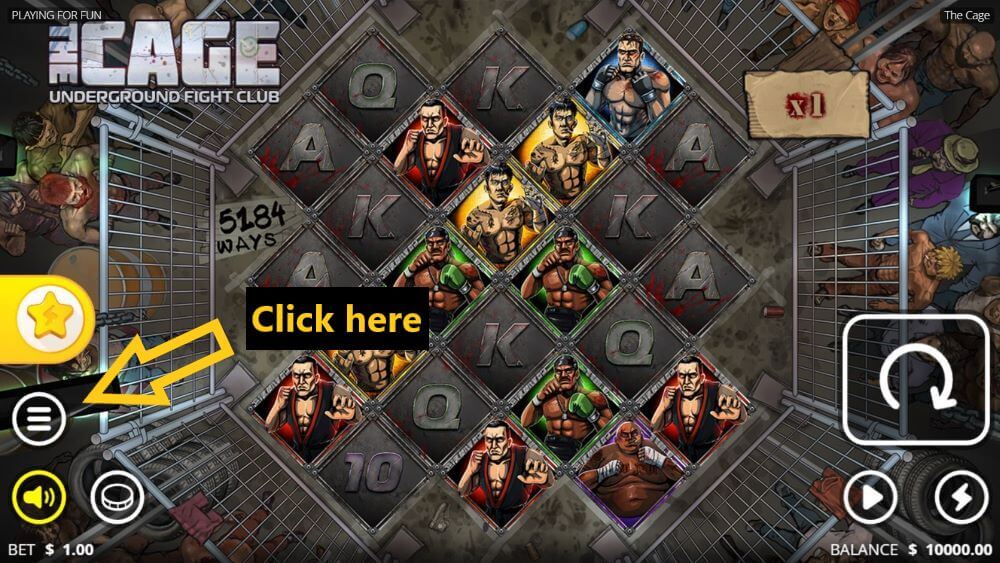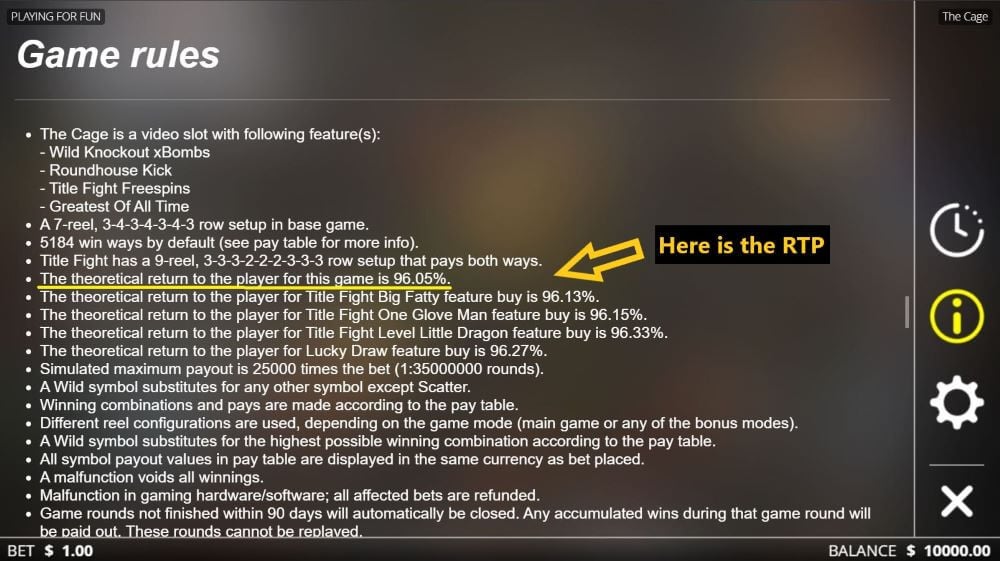What Is Return to Player?
The Return to Player (often shortened to just RTP) is a percentage that tells you how much you can expect to win on average over a long playing session at your top desktop or mobile casino.
When we say long, we mean a theoretical average that’s calculated over millions of spins on slots. Or millions of bets in table games like roulette, blackjack, and baccarat.
Of course, no single player is going to rack up millions of individual bets (we assume!). So, the average given by RTP figures is an important consideration or benchmark for players to consider as if millions of bets had been placed.
Let’s take a simple example for the purposes of this in-depth online gambling guide. Say a particular slot you want to play has a stated RTP of 98%.
In this case, it means that for every euro you bet, you can expect to win back an average of 98 cents.
The extra 2% is going to the casino – this last bit is known as the house edge, or to put it more simply, the expected profits made by the casino for each bet.
That might not sound like a great deal, of course, but 98% is considered to be a very high RTP percentage. And we must take into consideration that it is an average.
You can always beat the odds and walk away as a winner. It’s just that X number of other players will end up losing to the casino to balance it out.
How Is RTP Calculated?
Not to go too geeky here, but the way RTP is calculated on a general level is quite simple. It is the total amount won (or returned) to players divided by the total amount that was wagered by those same players.
So, the RTP is simulated through computer algorithms, playing millions of rounds in a short time to replicate real gameplay over years. With a random number generator (RNG), each spin has equal winning chances, ensuring accurate RTP calculation.
You’ll sometimes get lucky and all the big wins will just be rolling in. But, at other times, the same slot might give you nothing but losses. In short, for one player to win, someone else has to lose.
The only certain thing is that the casino gets to keep between 2% and 5% (or whatever percent the house edge is) of the bets. The rest is paid out as winnings to random players.
The RTP is always lower than 100%. This means if you keep playing and playing, you'll lose in the end.
You can, of course, be lucky and get quite a few big wins, but the trick is to withdraw your winnings at some point. If you keep betting your winnings over and over again, the slot will leave you empty-handed. Unless you win a jackpot, of course…
How to Find RTP on Slots
Okay, so now you may have a better understanding of what RTP in slots means. But how do you find the RTP in a specific slot game?
It's actually very simple in most cases. Almost every game provider states this information in the game rules of the slot. Just click the "information" button and check the rules or paytable.


Of course, the icons and information may be presented slightly differently depending on the game you're playing. However, this is more or less how it works for every casino game available.
Top 10 High RTP Slots
Now that you have familiarized yourself with the concept of RTP (Return to Player), let's explore some of the slot games that provide the most favourable payout percentages. These games generally offer satisfactory rewards and ensure you enjoy a substantial amount of gameplay.
| Ranking | Slot Title | Game Provider | RTP |
| #1 | Book of 99 | Relax Gaming | 99% |
| #2 | Ugga Bugga | Playtech | 99% |
| #3 | Plinko | BGaming | 99% |
| #4 | Gates of Heaven | Pragmatic Play | 98% |
| #5 | Zeus Wild Thunder | SYNOT Games | 97.99% |
| #6 | Heimdall's Gate | Kalamba Games | 97.21% |
| #7 | Aloha Fruit Bonanza | TrueLab Games | 97.01% |
| #8 | Beast Band | BGaming | 97% |
| #9 | The Big Deal Deluxe | Habanero | 96.85% |
| #10 | Fruity Candy | PG Soft | 96.75% |
Slots Versus Table Games
For full disclosure, we must state that the RTP of any given game isn’t always an indicator of your chances of winning each time. At least not when it comes to online casino slots.
For example, a progressive jackpot slot might have a relatively low RTP of around 70%. This is because one spin can end up winning a jackpot of millions of euros. Yet, the overwhelming number of spins won’t win anything or only a small amount.
So, while the figure is low for jackpot games, the risk might be worth it. There’s always a chance that the reels go into a complete meltdown and you end up pocketing a jackpot win. But, it’s a different story for table games. Let’s take roulette as an example.
In Roulette, you can reasonably expect to pick up an almost equal amount of wins and losses. That is if you’re sticking to something like even money bets on red, black, odd, even, high, or low.
That’s because the chances of winnings are around 50% – though not quite because of the zero or double zero pockets on the wheel. So, even money bets have odds of 48.64% each time, with a house edge of 2.70%.
All the other types of wager have been carefully calculated to maintain this house edge, which means the Return to Player is 97.30%.
Does the RTP Really Impact Your Winning Chances?
Yes, and no. Of course, if you play and play and play millions of game rounds, then yes, the RTP will impact you. But if you’re like most casual players and play maybe some hundreds of game rounds per session on a specific game, the RTP won’t have much of an impact on you. In many ways, the RTP is much more important for the casino than for an individual player.
You should never forget that time is the casino’s best friend, meaning that the longer you play, the more likely you are to lose. The casino always wins in the long term.
Therefore, as a player, you shouldn’t play millions of game rounds. When you get a win you’re happy with, you should cash out your winnings and not trust that your luck will continue. If you keep on playing, chances are that you’ll eventually lose, whether the game has an RTP of 95% or 98%.
Always remember that the RTP will never be 100%, as the casino needs to make a profit to be able to offer the game. When you win, and basically get more than your fair share of the RTP, it means another player gets less than what their theoretically allotted RTP should be. And when you do win, that’s purely down to luck. You can’t trust your luck to last forever, no matter what the RTP.
What is more likely to impact how much you win in a game, especially on slots, is the volatility.
RTP – Conclusion
So, while it might seem quite confusing as to what Return to Player actually means, it’s relatively straightforward once it’s been explained.
You can now use this information to reliably inform yourself about your chances of winning whenever you find a new game to play. You can also balance out the odds of winning versus the payouts expected for each type of bet you make. Good luck!





